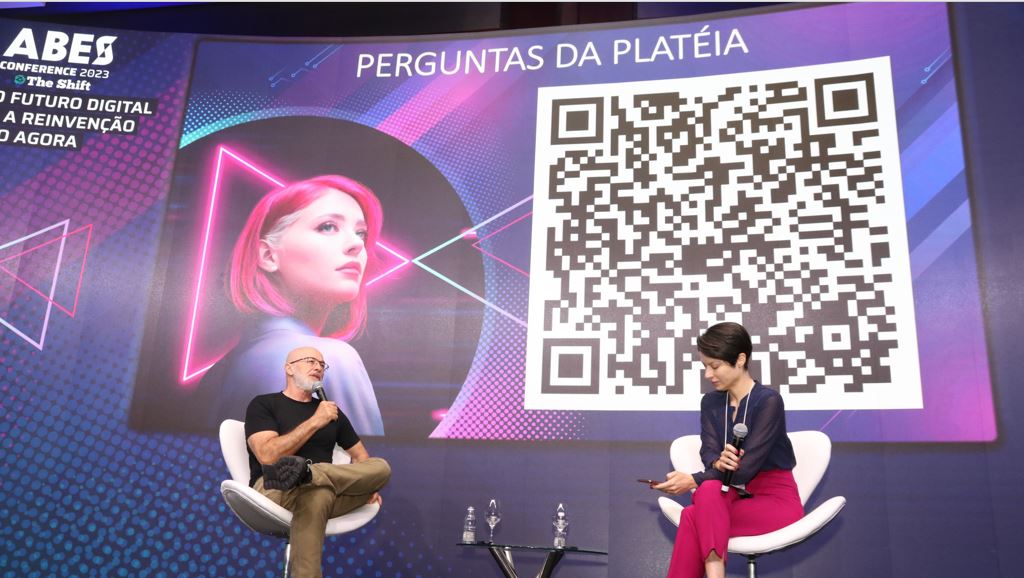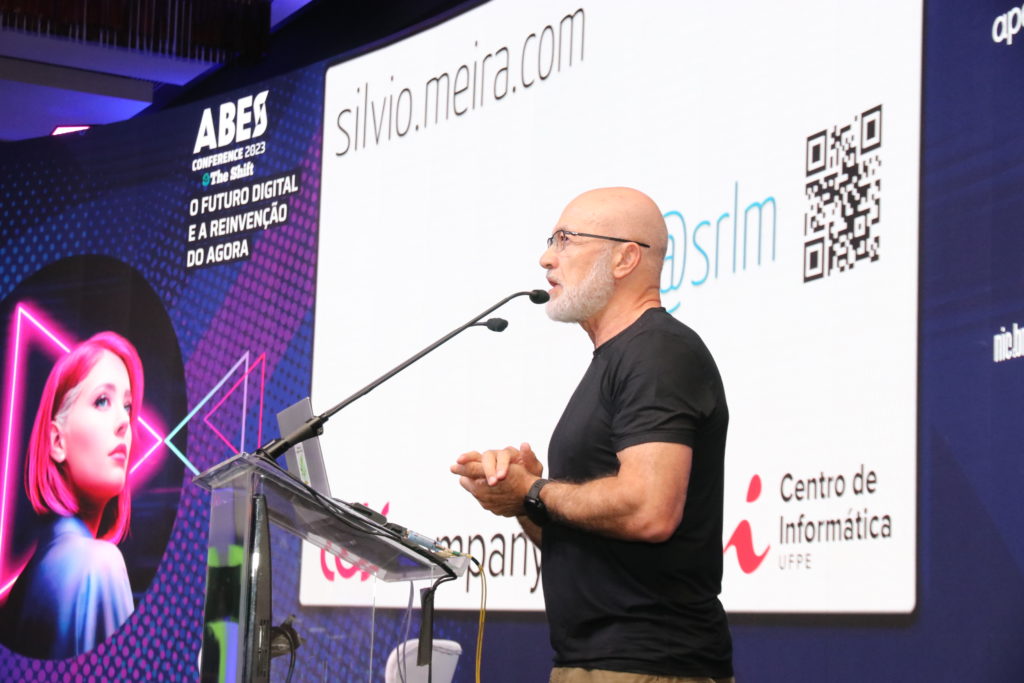
We live in a time of accelerated transformation, driven by technological advances that are shaping the course of human history. We are witnessing the birth of an era in which technology has the power to profoundly impact every aspect of our society. However, the true consequences of these changes cannot yet be fully understood, as we are only at the beginning of this journey. Based on this context, the edition 2023 ABES CONFERENCE, organized in partnership with the portal The Shift, brought as its central theme “The Digital Future and the Reinvention of Now”, and important experts from the innovation ecosystem, artificial intelligence, digital transformation, machine learning and the future of work in a hybrid and free on November 6, 2023. The conference was sponsored by ApexBrasil, TOTVS, AWS, Prosper Tech Talents, Caesbra, NIC.BR and SND Distribuidora.
The waves of impact from new technologies are spreading rapidly, permeating our everyday lives, economies, governance and social interactions. Artificial intelligence, cloud computing, the internet of things and other disruptive innovations are redefining the way we live and work. However, it is essential that we ask ourselves: how can we ensure that technology will bring out the best in humanity?
To make the most of technology's potential, it is vital that we understand its implications and reflect on the ethical and social issues it raises. We must invest in education and awareness, enabling people to understand the changes that are occurring and to make informed decisions.
 “The main point of the discussion is how to combine artificial intelligence with individual and social intelligence to solve problems on a scale completely different from what we have been dealing with until now”, highlighted Silvio Meira, Chief Scientist at TDS.company, Extraordinary Professor at CESAR .school and keynote speaker at ABES CONFERENCE 2023. The convergence between intelligences, referring to the increasing integration of technology and human intelligence, can, in fact, lead to a significant increase in professionals' performance. “Intelligence is informational to the storage of signals from virtual experiences. A recent survey revealed that 68% of global CEOs will deploy AI in the next 18 months.
“The main point of the discussion is how to combine artificial intelligence with individual and social intelligence to solve problems on a scale completely different from what we have been dealing with until now”, highlighted Silvio Meira, Chief Scientist at TDS.company, Extraordinary Professor at CESAR .school and keynote speaker at ABES CONFERENCE 2023. The convergence between intelligences, referring to the increasing integration of technology and human intelligence, can, in fact, lead to a significant increase in professionals' performance. “Intelligence is informational to the storage of signals from virtual experiences. A recent survey revealed that 68% of global CEOs will deploy AI in the next 18 months.
However, it is important to note that specific predictions about increased income may vary and depend on a series of factors, such as the work sector, individual skills and the effective adoption of technologies”, assesses Meira. However, it is important to highlight that the speed and impact of convergence between intelligences (artificial, individual and social) may vary in different sectors and contexts. Not all professionals can experience such a rapid or significant increase in performance. Furthermore, the Convergence between intelligences also brings with it challenges and ethical issues that need to be considered and addressed to ensure balanced and beneficial progress for society as a whole.
 In the scientist's opinion, it is possible that, with the appropriate use of available tools and technologies, professionals can improve their efficiency and productivity. For example, automating routine and repetitive tasks can free up time and resources for professionals to focus on more strategic and creative activities. Furthermore, access to large amounts of information and the use of machine learning algorithms can help make more informed and accurate decisions. Mastering the instruments, tools, theories and concepts related to artificial intelligence can, in fact, offer a competitive advantage to professionals. Those who adapt and develop skills in this field will probably be better prepared to face the challenges and take advantage of the opportunities that arise with the convergence between intelligences. “Every transformation, from the simple to the most complex, demands first and foremost a Good strategy to face the challenges of a future that arrives more and more quickly”, he explains.
In the scientist's opinion, it is possible that, with the appropriate use of available tools and technologies, professionals can improve their efficiency and productivity. For example, automating routine and repetitive tasks can free up time and resources for professionals to focus on more strategic and creative activities. Furthermore, access to large amounts of information and the use of machine learning algorithms can help make more informed and accurate decisions. Mastering the instruments, tools, theories and concepts related to artificial intelligence can, in fact, offer a competitive advantage to professionals. Those who adapt and develop skills in this field will probably be better prepared to face the challenges and take advantage of the opportunities that arise with the convergence between intelligences. “Every transformation, from the simple to the most complex, demands first and foremost a Good strategy to face the challenges of a future that arrives more and more quickly”, he explains.
“Technology can only bring out the best in humanity if it is accessible and benefits everyone. We must work together to overcome divisions and ensure that the technological revolution promotes digital inclusion, reducing the gap between those who have access and those who do not”, emphasizes Silvio Meira. He also emphasized that the only path to innovation is open innovation, given the need to activate knowledge networks, citing the successful Brazilian examples of Embrapa, in agribusiness, and Embraer, in the aviation sector.
From Silvio Meira’s presentation, we highlight 5 points that deserve attention:
- Ethics and Artificial Intelligence:
Artificial intelligence (AI) is one of the most impactful technologies today. As AI advances, complex ethical questions arise. We must ensure that AI systems are designed ethically, avoiding discriminatory bias, protecting data privacy, and ensuring transparency and accountability of algorithms. Furthermore, it is important to establish clear limits for the use of AI in sensitive areas, such as the military.
- Employment and Automation:
Automation and robotization have the potential to transform the global workforce. While some jobs may be replaced by machines, new job opportunities may arise in technology-related sectors. However, it is essential to ensure that there are professional retraining and reconversion programs to help workers affected by automation, avoiding the expansion of social inequalities.
- Privacy and Data Security:
Technological advancement generates a massive amount of personal data. It is essential to ensure the protection of individuals’ privacy and the security of this data. Robust policies and regulations must be established to prevent the misuse of personal information, as well as promoting transparency of data collection, storage and use practices.
- Education and Digital Literacy:
To fully realize the benefits of technology, it is crucial to invest in education and digital literacy. We must empower people so that they can understand, use and adapt to new tools and technologies. This includes not only access to technological infrastructure, but also the development of digital skills, critical thinking and problem-solving abilities.
- Sustainability and Technology:
Technology also plays a key role in addressing environmental challenges and promoting sustainability. Innovative solutions, such as renewable energy, smart transportation and precision agriculture, can help mitigate the impacts of climate change and promote the efficient use of natural resources. Green technology must be a priority to ensure a sustainable future.
Ultimately, technology must be geared toward meeting human needs, improving quality of life, and solving pressing problems such as poverty, hunger, disease, and climate change. We must ensure that innovation is directed towards the common good, prioritizing solutions that promote sustainable development and global well-being.














